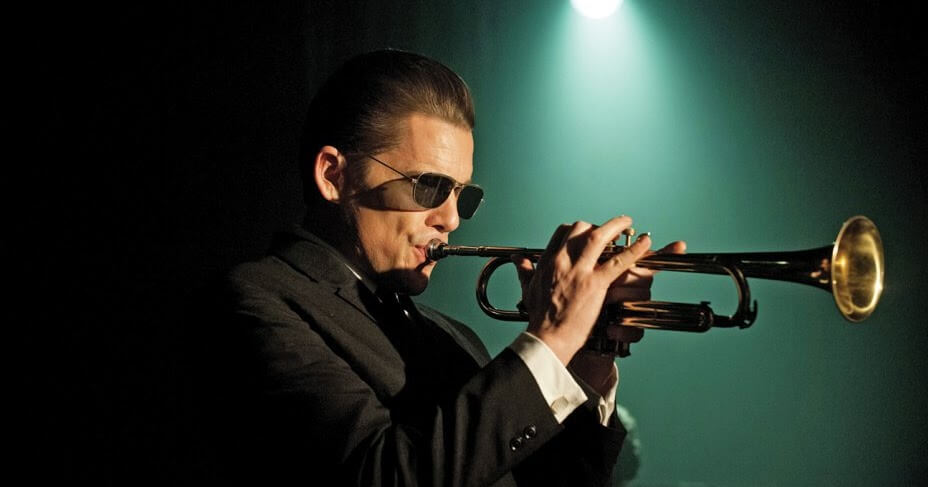Born to be Blue [2015] is the latest film from Canadian director Robert Budreau.
Enter, One West Coast White Cat… ‘Born to be Blue’ is not only a jazz standard but also a thinly veiled remark on famed jazz musician, notorious junkie Chet Baker’s life story. In Budreau’s part-biopic, part-fictional re-telling of Chet Baker’s later years, Ethan Hawke shines in his interpretation of this troubled icon. Hawke captures the flawed humanity of Chet in conjunction with how genial and charming he can be when he’s wooing us. Hawke and Chet are both unforgettable for related but distinct reasons. Chet’s music is unlike anyone else’s and Hawke has an onscreen presence that is similarly unique; to use one to bring the other back to life is inspired. Hawke also makes for a convincing trumpet player, though, admittedly, mine isn't the most discerning of eyes as I am no musician—only a jazz fan.
Blue Notes… To segue from Hawke’s performance—which includes many a scene with him and a trumpet—another noteworthy aspect of Born to be Blue is simply the music. And one should hope that the music in a film about a famed musician would be noteworthy and thankfully Budreau did not disappoint. Yet, as good as the music is, the film suffers a bit from one too many picturesque shots of Chet and his trumpet amidst austere and/or expansive landscapes as he recovers from a brutal beating that damaged his embouchure. The message is not lost: the artist’s path is a lonely path and it’s even lonelier when you’re one of a kind. And though the nature is beautiful and both Ethan Hawke and Carmen Ejogo are beautiful, these shots—and there are many—feel a little cliched and a little self-indulgent. And though there’s nothing wrong with scenic montages in and of itself, there needs to be something more substantial to break up the superficiality of a putting Ethan Hawke and a trumpet moping around in nature.
Over-Sugared & Under-Spiced… Born to be Blue is a fine film if a bit tame, which makes its R-rating a bit difficult to understand (though, truly, that’s nobody’s fault but the MPAA’s). Though Chet is neither depicted as a better person than he was nor editorialized into a version that rings untrue, the film ultimately leaves Chet unexamined. Though there are great performances and emotive music for viewers to sink their teeth into, this film lacks bite in that it never really amounts to much more than another story about a troubled musician who is their own worst enemy. Despite being a bit vanilla, this film isn’t as offensively basic as it may thus far seem. Chet Baker, the real person, was, at one point, offered film roles. His silver screen debut is the 1955 war film Hell’s Horizon. And early in Born to be Blue, Budreau shows Hawke’s Chet playing Chet in a film that’s supposed to help him stage a comeback. Here, Budreau quite adeptly handles those ‘movie scenes’ inside his movie as it was immediately obvious that they were scenes from a ham-fisted and sensationalized film. In this sense, Budreau seems to demonstrate a degree of self-reflexivity almost showing us the obvious film that could have been made and then marching forward with his own.
A Chet Baker pseudo-biopic that promises more than it delivers.

